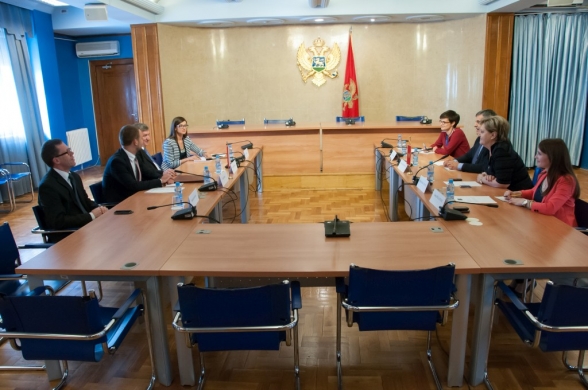Chairperson of the Committee on European Integration Mr Slaven Radunović and Deputy Chairperson of the Committee Ms Marija Maja Ćatović met Vice Marshal of the Polish Sejm Mr Jerzy Wenderlich.
The meeting was marked by the exchange of the Polish and Montenegrin experiences in negotiations with the EU, wherein the interlocutors agreed that in the accession process to the Union, it was important to continuously improve standards in order to raise the quality of citizens’ life and thus their greater support to the Union. Vice Marshal of the Polish Sejm Mr Jerzy Wenderlich said that at the beginning of their accession process, doubt was expressed by agriculturists, having in mind a wide range of rights in the field of agriculture and food safety which were to be accepted. He emphasised that in the negotiation process, Poland was adopting up to 750 laws annually and that in the present it has achieved 66-68% of economic and social standards of the “old” member states and that it has been developing faster than other EU member states.
Chairperson of the Committee Mr Slaven Radunović presented the current state in the accession negotiations of Montenegro with the EU, stressing that 18 negotiation chapters were opened in total, and that the opening of additional two chapters was expected to happen soon. He added that Montenegro was in better position that Poland in that time regarding the negotiation process, since for almost ten years the harmonisation with the EU acquis has been taken into account while adopting the laws. However, he said that significantly tougher challenges were in front of Montenegro, having in mind administrative capacities but also harsher criteria set after the previous enlargements.
Deputy Chairperson Ms Marija Maja Ćatović said that in the process of political and economic reforms, the Parliament had an important role of harmonisation of laws, aimed at achieving the level of quality life of member states, including even those of the middle and east Europe which successfully completed the accession process ten years ago. She added that Montenegro was taking cue from Polish experiences with regard to using pre-accession funds, having in mind that Poland was recognised as a state which, through different programmes – currently unified in the IPA programme - succeeded to transform its society economically.
The interlocutors agreed that quality implementation of the EU standards was a key aspect of successful path towards the membership, and Vice Marshal of the Polish Sejm voiced pleasure over the exchange of experiences with the chairs of the Committee, which was evaluated as a parliamentary locomotive on Montenegro’s path to the EU.
In addition to Deputy Marshal of the Sejm, the meeting was attended by Deputy Director of the International Affairs Bureau of the Polish Sejm Mr Bogdan Janowski and chargé d'affaires in the Embassy of Poland to Montenegro Mr Paweł Łącki.









